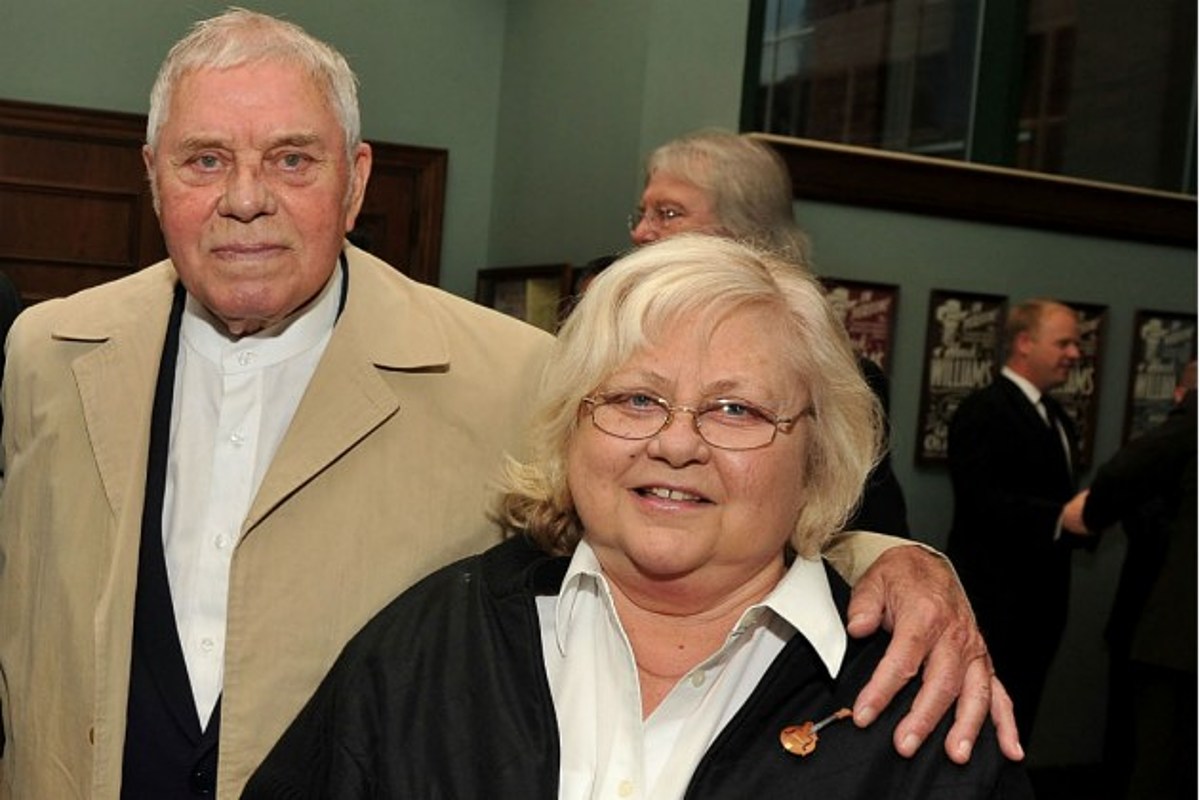Dixie Hall (born Iris Violet May Lawrence) was a force in country and bluegrass songwriting; with over 500 songs to her name, most consider her the most prolific female songwriter in bluegrass music. She was also a music journalist, an animal rights activist and the boss of an independent record label, Blue Circle Records. But it was songwriting that helped her meet her husband, Country Music Hall of Famer Tom T. Hall, and songwriting became part of the couple’s legacy.
Dixie Hall wrote Dave Dudley’s 1965 hit “Truck Drivin’ Son of a Gun,” a BMI Citation of Achievement-winning song. On the flip side of that record was a song called “I Got Lost,” by none other than Tom T. Hall — at the time, a little-known singer-songwriter. It was because of that record that the future husband and wife met, at the BMI Country Awards in Nashville in 1964. However, their initial conversation was not exactly romantic.
“It was the usual steak and potato thing,” Dixie Hall told Bluegrass Unlimited in 2013. “And Tom Hall, as he was known then, was seated across the table, so we had to speak. He said, ‘Do you like potatoes?’ And I said, ‘Yes, why?’ And he said, ‘Is that why you’re so fat?’ And I was positively skinny.”
Maybelle Carter, who was with Dixie Hall at the time, was shocked, but Hall didn’t let it stop her from getting to know the man who would become her husband. Their early courtship would have made a good country song.
“I ran into him later at the Disc Jockey Convention, and he invited me to go fishing, and I jumped at the chance. I thought he was okay,” Dixie Hall recalled. “We went fishing and caught a huge catfish. I made him keep it in the bathtub in his apartment because I just couldn’t see it being killed. It was huge.”
The couple got married in 1968, and Dixie Hall took a break from songwriting while her husband, who added the “T” to his name, built his career, churning out well-known hits such as “A Week in a Country Jail,” “(Old Dogs, Children and) Watermelon Wine,” “Country Is” and “I Like Beer.” It wasn’t much of a break, however: Dixie Hall spent that time raising and showing basset hounds and working for the Nashville Humane Society, helping the non-profit organization raise over $1 million.
Tom T. Hall once praised his wife’s success, saying, “She built this studio, started a publishing company and a record label. She built the whole thing, while I was playing golf and mowing the grass.”
Tom T. Hall retired in the 1990s, but his wife wouldn’t let him let his career die.
“I said it was okay to quit the road, but don’t give up on music,” she told him. “Music is too much of a treasure to throw it away.”
Tom T. Hall apparently pushed back a bit.
“I kept on him,” Dixie Hall said. “And he finally said, ‘If it’s such a treasure and so easy to do, you do it.’”
And Dixie Hall did do it, writing songs such as ”Your Memory Followed Me Home” and “High Lonesome Road” for Nancy Moore. Eventually, her husband caved and joined her … and Dixie Hall’s persistence kept on throughout the remainder of the songwriting couple’s career.
“She’s one of the most driven women I’ve ever met,” Tom T. Hall admits. “She would not take ‘no’ for an answer. She’d call people three times a day, tell them, ‘We’ve got a song for you.’ If they didn’t want that one, she’d call them back with another.”
To say that the Halls were successful as a songwriting team is an understatement: Tom T. and Dixie Hall won the Grand Masters Gold prize from the Society for the Preservation of Bluegrass Music of America following 10 consecutive Songwriters of the Year wins. Part of what made them so successful — as a couple and as a songwriting team — was their difference in perspective: Tom came from Appalachia, while Dixie was raised in the West Midlands in England; she didn’t come to America until 1961.
“I was born in the foothills of the Appalachian Mountains and spent my whole life trying to get out of there. Maybe our bluegrass songwriting works so well because we have such different views of Appalachia,” Tom T. Hall tells The New York Times. “As an outsider, Miss Dixie sees these people as the hard-working, family-loving salt of the earth. As a member of the clan I see them as just the neighbors. She can see the trees, while all I can see is the forest.”
Dixie Hall died on Jan. 16, 2015, at the age of 80. The couple had been married for 46 years.
